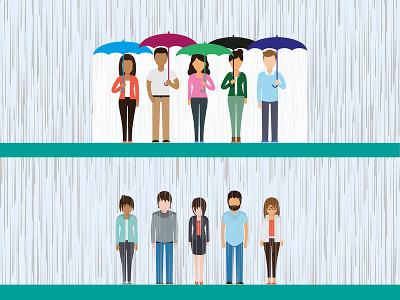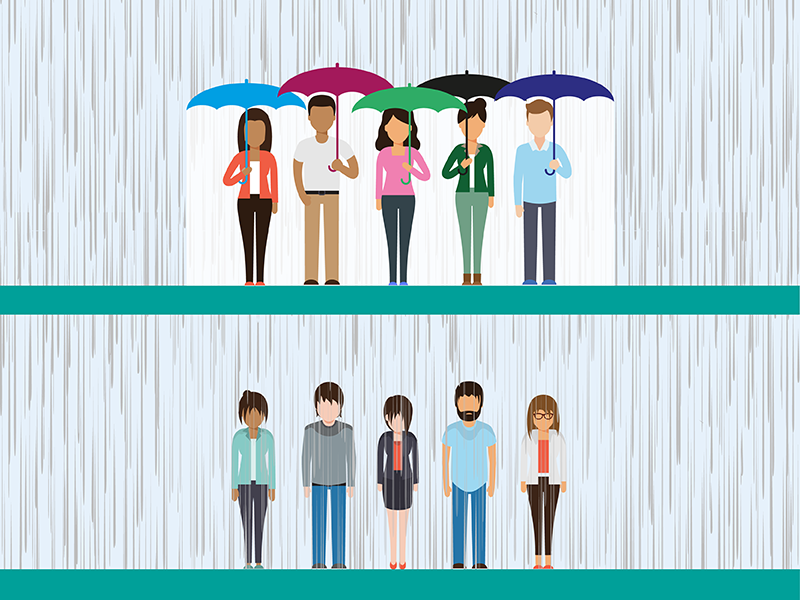It's raining, it's pouring: An update on inequalities in Gateshead 2017-20

Gateshead's most disadvantaged residents have been caught in a "perfect storm" of welfare reform, austerity and the Covid-19 pandemic, according to the latest report from the Director of Public Health.
Alice Wiseman's annual report for 2020, "It's raining, it's pouring", highlights an unacceptable pattern of disadvantage within local communities. It provides an update on the issues set out in the 2017 report, "It never rains but it pours", which revealed that the life expectancy of two babies born on the same day in Gateshead could vary by up to 10 years depending on the circumstances into which they are born.
Alice said: "The link between poverty, mental health and chronic disease has been well-documented. We also know that when children are born into deprivation, the issues they face affect their physical and emotional development - which could have life-long implications for their health and wellbeing.
The Covid-19 pandemic has exacerbated these inequalities and created new pressures for those in the most deprived communities. These groups were more likely to either to be furloughed and to struggle to survive on 80% of minimum wage, or to work in environments where social distancing is difficult, placing them at higher risk of infection. We have seen this disproportionate risk evidenced in the deaths of key workers across all settings; the very people who kept our country running at the hardest of times."
Although the long-term impact of the pandemic remains to be seen, the report describes the economy and public health as two sides of the same coin and calls for economic recovery efforts that focus on supporting Gateshead's most vulnerable residents.
The report includes personal stories that highlight the specific challenges faced by individuals and how they have been supported by the Council and its partners. Alice explained: "Statistics can only tell us so much. We need to listen to the voices of the people who are living through these issues in order to help them, to prevent others from experiencing the same hardships.
In 2018, we commissioned research into the issues faced by local people claiming Universal Credit and found that many claimants were forced into debt, rent arrears and extreme hardship, with serious consequences for their wellbeing. At a time when more people than ever have had to turn to the benefits system, these findings have helped us to better support our communities and persevere with our call for change."
To amplify the voices of the research participants, a short film produced by theatre company Cap-a-Pie was released online earlier this month. It features actors bringing the experiences of Universal Credit claimants to life alongside contributions from Alice, lead researcher Mandy Cheetham and others. The video highlights some of the key findings from the research and calls for a fairer system that prioritises the resources and support available for those that need it most.
"It's raining, it's pouring" concludes that although Gateshead Council and its partners have made some good progress on tackling inequalities, there is still a long way to go - particularly in the wake of the pandemic. The focus must remain on giving people a fair chance and breaking the cycles of disadvantage.

Gateshead's most disadvantaged residents have been caught in a "perfect storm" of welfare reform, austerity and the Covid-19 pandemic, according to the latest report from the Director of Public Health.
Alice Wiseman's annual report for 2020, "It's raining, it's pouring", highlights an unacceptable pattern of disadvantage within local communities. It provides an update on the issues set out in the 2017 report, "It never rains but it pours", which revealed that the life expectancy of two babies born on the same day in Gateshead could vary by up to 10 years depending on the circumstances into which they are born.
Alice said: "The link between poverty, mental health and chronic disease has been well-documented. We also know that when children are born into deprivation, the issues they face affect their physical and emotional development - which could have life-long implications for their health and wellbeing.
The Covid-19 pandemic has exacerbated these inequalities and created new pressures for those in the most deprived communities. These groups were more likely to either to be furloughed and to struggle to survive on 80% of minimum wage, or to work in environments where social distancing is difficult, placing them at higher risk of infection. We have seen this disproportionate risk evidenced in the deaths of key workers across all settings; the very people who kept our country running at the hardest of times."
Although the long-term impact of the pandemic remains to be seen, the report describes the economy and public health as two sides of the same coin and calls for economic recovery efforts that focus on supporting Gateshead's most vulnerable residents.
The report includes personal stories that highlight the specific challenges faced by individuals and how they have been supported by the Council and its partners. Alice explained: "Statistics can only tell us so much. We need to listen to the voices of the people who are living through these issues in order to help them, to prevent others from experiencing the same hardships.
In 2018, we commissioned research into the issues faced by local people claiming Universal Credit and found that many claimants were forced into debt, rent arrears and extreme hardship, with serious consequences for their wellbeing. At a time when more people than ever have had to turn to the benefits system, these findings have helped us to better support our communities and persevere with our call for change."
To amplify the voices of the research participants, a short film produced by theatre company Cap-a-Pie was released online earlier this month. It features actors bringing the experiences of Universal Credit claimants to life alongside contributions from Alice, lead researcher Mandy Cheetham and others. The video highlights some of the key findings from the research and calls for a fairer system that prioritises the resources and support available for those that need it most.
"It's raining, it's pouring" concludes that although Gateshead Council and its partners have made some good progress on tackling inequalities, there is still a long way to go - particularly in the wake of the pandemic. The focus must remain on giving people a fair chance and breaking the cycles of disadvantage.
